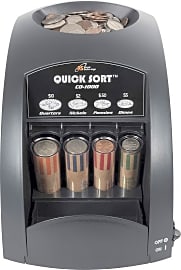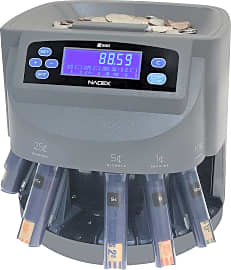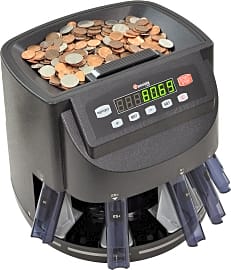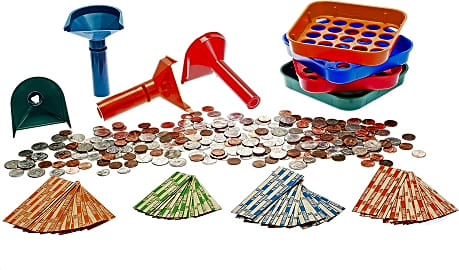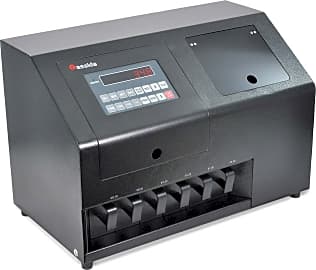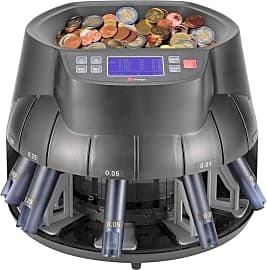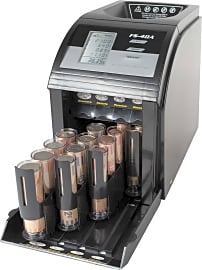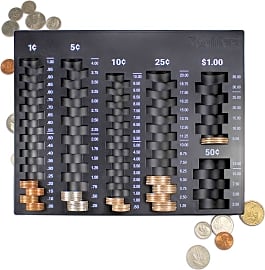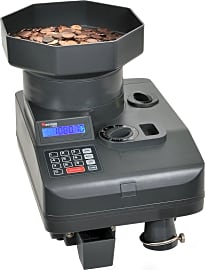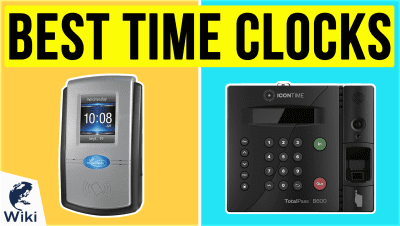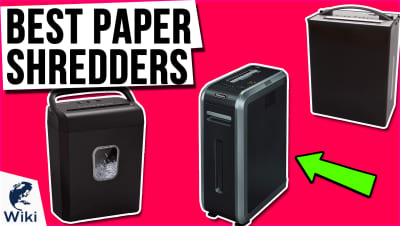The 10 Best Coin Sorters

This wiki has been updated 39 times since it was first published in March of 2015. If your change jar is starting to overflow, but you can't be bothered to count it all out by hand, there's a solution out there for you. Use one of these time-saving coin sorters to cash in and convert your hard-saved loot to bills. We've included both manual and electric models suitable for home use, as well as faster and more durable units that can keep up with the needs of businesses. When users buy our independently chosen editorial choices, we may earn commissions to help fund the Wiki.
Editor's Notes
January 03, 2021:
As one might expect, there is not a lot of new releases in the quality coin sorter market from year to year, which meant that the majority of our recommendations retained their places and we didn't need to make a lot of changes during this update. In fact, we only removed a single machine this year, and that was the Royal Sovereign Hand Crank. In its place, we added the Royal Sovereign CO-1000, which is an automated model that doesn't cost much more than the hand-cranked option. We did, however, find a couple of new sorters worth including, and these were the Cassida C300 and Pittaigo CH50A. Both of these machines offer a running tally of the total value of coins counted, as well as a breakdown of the denominations, and the latter even allows you to set specific quantities of certain coins to be sorted, after which it will automatically stop.
April 25, 2019:
Although we liked the functionality of the Semacon S-530, we decided to remove it due to occasional issues with durability, which seem inappropriate given the hefty price tag. Instead, we think the Cassida Heavy Duty is a fine substitute for those who need a beefy machine to handle a high volume of coins. Its padded bins are a nice touch that will prevent annoying noise, and it isn't unnecessarily complicated. As for more budget-friendly options, we still believe that the Cassida C200 Roller and the Royal Sovereign Electric will work for a wide range of users. The latter is the less costly choice, but it's also more likely to jam, so there is a slight trade-off. Finally, we added the Kolibri Tray, which is meant for sorting as you go — it won't turn a giant bag of currency into neat rolls or piles. It's incredibly easy to use, however, and may make a great tool for those who prefer keeping up with the task of sorting on a day-to-day basis.
What Separates an Average Coin Sorter From a Great One?
Purchasing any model like this requires some due diligence on the behalf of the consumer.
If you own a small business, or you simply like to keep an automatic sorter for the occasional build-up of coins, chances are you can probably get away with using a fairly inexpensive, rudimentary model. But the more coinage you accumulate, the greater a need you have for an elite coin sorter that can save you time and aggravation and work.
The best coin sorters are extremely sensitive and they don't require the user to make any adjustments, or to limit coin flow. Top-of-the-line machines can simply take the coins they're given, then spit those coins back out, very often in several orderly batches. Advanced machines maintain an overhead display much like a treadmill. That display allows you to toggle between "Total", breakdown by coin, and perhaps even the aggregated weight of each group.
Certain custom-made machines can even be programmed to provide an instant breakdown by exchange rate. This is an important feature, in that these "exchange-rate models" can also be programmed to accept and sort a lot of foreign coins. Purchasing any model like this requires some due diligence on the behalf of the consumer. The most important aspect to confirm is that a machine will actually be able to detect and sort the type of coins that you're most interested in. As a general rule, the more common the denomination, the more likely you can find a coin sorter that can accommodate your needs.
How to Clean a Coin Sorter
The more you use a coin sorter, the filthier its inner-workings become. More importantly, dirt and dust are the primary sources behind a lot of sorter malfunctions. Coin-sorter malfunctions are not only time-consuming, but depending on the circumstance, they could either: A) throw off your machine's accuracy, or B) force you to turn off the machine, then run all of your coinage back through again.
Wet wipes serve a similar purpose, with the primary difference being that these wipes may also allow you to access some minor crevices where dirt and dust get trapped.
The point being that proactive is much better than reactive when it comes to coin sorters. Assuming you keep up with the cleaning and detailing of the machine, the process of sorting your change should be quick and precise and relatively easy.
First things first. Your machine should have a dust cover over it whenever it isn't in use. Beyond that, you can alleviate a lot of minor buildup by running an air hose along the coin tray and the individual slots. Wet wipes serve a similar purpose, with the primary difference being that these wipes may also allow you to access some minor crevices where dirt and dust get trapped. If you have a mini vac with some extensions, you can use that to get into some of these crevices, as well.
As a final precaution, make sure to sift through any coins that are in a tray before filtering that currency down into the machine. You could find anything from a foreign denomination to a wood chip. The bottom line being that any object that does not fit the exact specifications of an accepted currency can, and very likely will, result in a jam.
A Brief History of The Coin Sorter
You know those miniature sliding-board contraptions that disburse small change whenever you pay with cash at a convenience store? The original concept for those was invented by a man named Hugo Baur in 1912. Baur was from Chicago, and he referred to his invention as a "total-registering means for coin-receiving prepayment devices." Whether it was a lack of demand or Baur's general lack of salesmanship, his coin-receiving prepayment machine didn't initially take off.
Today's sorters are whip fast and they're completely automated.
And yet Baur must have known that he was onto something. For he kept at it, and in 1919, he filed for another patent. This time Baur had invented a fairly straightforward - and necessary - coin-counting machine. According to a Popular Science article from that era, Baur's invention operated by having up to 10 coins of any [American] denomination placed into a single tube, which was then run along a grooved track. That track would, in turn, recognize - and separate - each denomination by its diameter and shape. Once coins were dropped into each groove, they would slide down into an appropriate column. Each column, once filled, could be released into a separate tube for counting (then wrapping).
If Baur's process seems familiar, that might be because it's a fairly unrefined version of the coin sorters that we use today. Sure, there have been a lot of innovations over the past 100 years. Today's sorters are whip fast and they're completely automated. They can handle a larger volume, and they can do all the calculating themselves. Yet in the end these automated machines are simply separating coins based on shape, and weight, and denomination ... all before dropping said coins into a burlap bag - or an appropriate bin - for a deposit.


